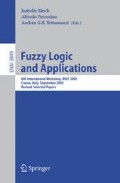Abstract
In the context of inductive inference Solomonoff complexity plays a key role in correctly predicting the behavior of a given phenomenon. Unfortunately, Solomonoff complexity is not algorithmically computable. This paper deals with a Genetic Programming approach to inductive inference of chaotic series, with reference to Solomonoff complexity, that consists in evolving a population of mathematical expressions looking for the ‘optimal’ one that generates a given series of chaotic data. Validation is performed on the Logistic, the Henon and the Mackey–Glass series. The results show that the method is effective in obtaining the analytical expression of the first two series, and in achieving a very good approximation and forecasting of the Mackey–Glass series.
Access this chapter
Tax calculation will be finalised at checkout
Purchases are for personal use only
Preview
Unable to display preview. Download preview PDF.
References
Solomonoff, R.J.: A formal theory of inductive inference. Information and Control 7(1-22), 224–254 (1964)
Kolmogorov, A.N.: Three approaches to the quantitative definition of information. Problems of Information and Transmission 1, 1–7 (1965)
Falcioni, M., Loreto, V., Vulpiani, A.: Kolmogorov’s legacy about entropy, chaos and complexity. Lect. Notes Phys. 608, 85–108 (2003)
Koza, J.R.: Genetic Programming II: Automatic Discovery of Reusable Programs. MIT Press, Cambridge (1994)
Whigham, P.A.: Grammatical Bias for Evolutionary Learning. PhD thesis, School of Computer Science, University of New South Wales, Australia (1996)
Strogatz, S.: Nonlinear Dynamics and Chaos. Perseus Publishing, Cambridge (2000)
Hénon, M.: A two–dimensional mapping with a strange attractor. Communications of Mathematical Physics 50, 69–77 (1976)
Mackey, M.C., Glass, L.: Oscillations and chaos in physiological control systems. Science 287 (1977)
Author information
Authors and Affiliations
Editor information
Editors and Affiliations
Rights and permissions
Copyright information
© 2006 Springer-Verlag Berlin Heidelberg
About this paper
Cite this paper
De Falco, I., Della Cioppa, A., Passaro, A., Tarantino, E. (2006). Genetic Programming for Inductive Inference of Chaotic Series. In: Bloch, I., Petrosino, A., Tettamanzi, A.G.B. (eds) Fuzzy Logic and Applications. WILF 2005. Lecture Notes in Computer Science(), vol 3849. Springer, Berlin, Heidelberg. https://doi.org/10.1007/11676935_19
Download citation
DOI: https://doi.org/10.1007/11676935_19
Publisher Name: Springer, Berlin, Heidelberg
Print ISBN: 978-3-540-32529-1
Online ISBN: 978-3-540-32530-7
eBook Packages: Computer ScienceComputer Science (R0)

